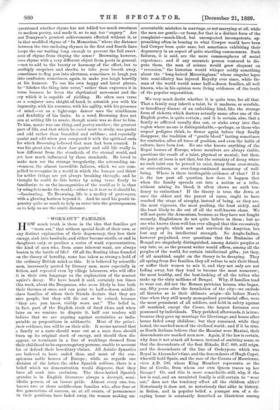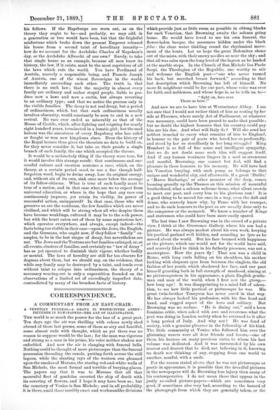"WORN-OUT" FAMILIES. H OW much truth is there in the idea
that families get "worn out," that without special fault of their own, or any distinct explanation of their degeneracy, they lose their energy, sink into lassitude, and either become sterile, or end in 'daughters only, or produce a series of weak representatives, the kind of men who, from some inherent want, are always beaten in the battle of life? Of all the floating ideas founded on the theory of heredity, none has taken so strong a hold of the ordinary British mind as this. It is believed by scientific men, incessantly quoted by literary men, more especially in -fiction, and repeated even by village labourers, who will offer it in their own language as the explanation of the nearest squire's decay. We have heard it said, certainly ten times this week, about the Braganzas, who seem likely to lose both their thrones at once, and can point to half-a-dozen middle- class families of whom their friends declare that they are nice people, but they will die out or be ruined, because ." they are, you know, visibly worn out." The belief is, in fact, part of the English stock of fixed ideas, and when later on we -venture to dispute it, half our readers will believe that we are arguing against certainties as indis- putable as propositions in arithmetic. Most of the prima% facie evidence, too, will be on their side. It seems natural that a family or a caste should wear out as a man does, should barn up its original stock of energy, and should then dis- appear, or terminate in a line of weaklings doomed from their childhood to be supererogatory persons, unable to account for or defend their hereditary claims. All Asiatic dynasties are believed to have ended thus, and most of the con- spicuous noble houses of Europe ; while as regards one division of the latter, the older Spanish noblesse, there is a belief which no demonstration would disprove, that they have all sunk into cretinism. The three-hatted Spanish grandee is in English literature always a decrepit, semi- idiotic person, of an insane pride. Almost every one, too, knows two or three middle-class families who, after fonr or five generations of success, or, at all events, of permanence in their positions, have faded away, the women making un- accountable mistakes in marriage, or not marrying at all, while the men are gentle—or fussy, for that is a distinct form of the complaint—much-liked, but unrespected incompetents, ap- proaching often in bearing to what Cowper would have been had Cowper been quite sane, but sometimes exhibiting their degeneracy in an aspect of quite startling commonness. Such failures, it is said, are the mere commonplaces of social experience ; and if any eccentric person ventured to dis- pute them, the man of science would grow eloquent on "reversion," the historian would whisper acidly something about the "long-haired Merovingians," whose singular lapse into semi-idiotcy has injured Royalty ever since, while the man of the world would name half-a-dozen families, all well known, who in his opinion were living evidences of the truth of the popular superstition.
We very much doubt whether it is quite true, for all that. That a family may inherit a taint, be it madness, or scrofula, or hereditary disease of an enfeebling kind, like the strange form of ricketts which doctors actually name after one of the English gentes, is quite certain ; and it is certain, also, that a family so afflicted usually dies out, or sinks away into that region where no one is distinguishable,—perhaps, as those who respect pedigree think, to flower again before they finally disappear, the tradition of "gentle blood" lasting sometimes for centuries, after all trace of position, and even the habit of culture, have been lost. No one who knows anything of the Royal houses of Europe, whose members are always visible, questions the result of a taint, physical or mental ; but then, the point at issue is not that, but the certainty of decay where no such taint can be proved to exist, decay from over-strain, or over-culture, or over-long-continued monotony of well- being. Where is there irrefragable evidence of that ? If it is the law past all question, how does it happen that when the family spreads out into a nation or a tribe, without mixing its blood, it often shows no such ten- dency to extinction ? H the theory is true, the Jews, at once the oldest and the purest of races, ought to have reached the stage of atrophy, instead of being, as they are, the most vigorous? the most pushing, the least sickly, and the least likely to die out of all the well-known clans. We will not quote the Armenians, because, as they have not fought recently, Englishmen do not quite believe in them ; but no one who knows them well has ever alleged that this excessively antique people, which saw and survived the Assyrian, has lost any of its intellectual strength. No Anglo-Indian, however prejudiced, ever questions that the Brahmins of Bengal are singularly distinguished, among Asiatic peoples at any rate, or, as the present writer would affirm, among all the peoples of the world, for certain intellectual gifts ; yet they, of all mankind, ought on the theory to be decaying. They all spring from five families, they all refuse to mix their blood, or suffer their women to mix it, and they not only are not fading away, but they tend to become the most numerouP, the most healthy, and the best-looking of all the tribes who make up the sixty millions of Bengal. Why, if families tend to wear out, did not the Roman patrician houses, who began, say, fifty years after the foundation of the city—we exclude all theories as to their ultimate origin—die before Nero's time when they still nearly monopolised provincial office, were the most prominent of all soldiers, and held in safety against all mankind, except the °masa., the largest fortunes ever possessed by individuals. They perished afterwards, it is true, because they gave up marriage for libertinage, and house after house faded away childless; but they remained, while they lasted, the marked men of the civilised world; and if it be true, as North Italians believe, that the Massimi were Maximi, their descendants are marked men now. Again, if the law is certain, why does it not attack all houses, instead of omitting some, HO that the descendants of the first Mikado, B.C. 660, still reign, and the descendants of the line of Oodeypore, which was Royal in Alexander's time, and the descendants of Hugh Capet, who still hold Spain, and the race of the Counts of Maurienne, circa A.D. 500, whom King Humbert represents, or the line of Cerdic, from whom our own Queen traces up her lineage? Or, and this is more remarkable still, why, if the law is real, and an untainted family is still certain to "wear out," does not the tendency affect all the children alike? Notoriously it does not, so notoriously that alike in history, in fiction, and in popular belief, a younger son of a de- caying house is constantly described as illustrious among his fellows. If the Hapsburgs are worn out, as on the theory they ought to be—and probably, we may add, in a generation or two would have been, but that the frightful -misfortune which broke down the present Emperor released his house from a second taint of hereditary insanity— how do we account for the Archduke Charles of Napoleon's day, or the Archduke Albrecht of our own? Surely, to take that single house as an example, because all men know its history, the law, if it exists, must be the most capricious of all the laws which rule the world. You have Ferdinand of Austria, scarcely a responsible being, and Francis Joseph of Austria, one of the wisest Sovereigns in the world, immediately succeeding each other. The truth is, that there is no such law ; that the majority in almost every family are ordinary and rather stupid people, liable to pro- duce now a hero and now a cretin, but always reverting to an ordinary type ; and that we notice the process only in the visible families. The decay is not real decay, but a period of ordinariness, which, but that such ordinariness usually involves obscurity, would constantly be seen to end in a new revival. No race ever ended so miserably as that of the House of Castile, which, after fighting and reigning for nearly eight hundred years, terminated in a lunatic girl ; but the mad heiress was the ancestress of every Hapsburg who has ruled or fought or won new kingdoms since. Even the history of the Royal houses thus gives the theorists no data to build on, for they never consider it, but take as their proofs a single branch of each family, the one which occupied the throne.
It would be a melancholy thing if the theory were true, for it would involve this strange result : that continuous and suc- cessful culture and exertion sentence a race, which, on the theory, at a certain period must, to use a fine though half- forgotten word, begin to dwine away, lose its original energy, and, without sin of its own, sink once more below the average of its fellow-citizens. What is true of each family must be true of a nation, and in that case what are we to expect from universal education, or where is the hope that any race can continuously improve, yet retain its virility, its power of -successful action, unimpaired? In that case, those who will preserve us are the residuum, the few families which are never civilised, and which will be strong when all who despise them have become weaklings, cultured it may be to the n-th power, but with the heart eaten out of them by some mysterious law, which operates everywhere, and always, except indeed—the facts being too visible in their case—upon the Jews, the English, and the Germans, who ought now, if they follow " family " ex- amples, to be in the last stages of decay, but nevertheless are not. The Jews and the Teutons are but families enlarged, or, at all events, clusters of families, and certainly no "law of decay" has as yet operated to diminish their vigour, whether bodily or mental. The laws of heredity are still far too obscure for dogmas about them, but we should say, on the evidence, that -while any family may be destroyed by a taint, and tends even without taint to relapse into ordinariness, the theory of a necessary wearing-out is only a superstition founded on the observations of a limited set of exceedingly imperfect data, contradicted by many of the broadest facts of history.











































 Previous page
Previous page